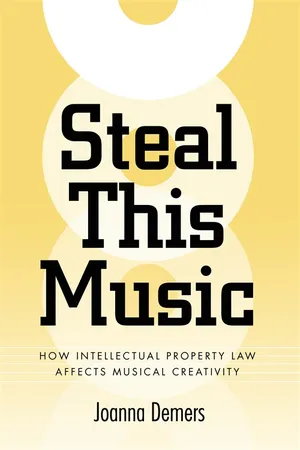
- 192 pages
- English
- PDF
- Available on iOS & Android
About this book
Is music property? Under what circumstances can music be stolen? Such questions lie at the heart of Joanna Demers's timely look at how overzealous intellectual property (IP) litigation both stifles and stimulates musical creativity. A musicologist, industry consultant, and musician, Demers dissects works that have brought IP issues into the mainstream culture, such as DJ Danger Mouse's "Grey Album" and Mike Batt's homage-gone-wrong to John Cage's silent composition "4'33." Demers also discusses such artists as Ice Cube, DJ Spooky, and John Oswald, whose creativity is sparked by their defiant circumvention of licensing and copyright issues.
Demers is concerned about the fate of transformative appropriation—the creative process by which artists and composers borrow from, and respond to, other musical works. In the United States, only two elements of music are eligible for copyright protection: the master recording and the composition (lyrics and melody) itself. Harmony, rhythm, timbre, and other qualities that make a piece distinctive are virtually unregulated. This two-tiered system had long facilitated transformative appropriation while prohibiting blatant forms of theft. The advent of digital file sharing and the specter of global piracy changed everything, says Demers. Now, record labels and publishers are broadening the scope of IP "infringement" to include allusive borrowing in all forms: sampling, celebrity impersonation—even Girl Scout campfire sing-alongs.
Paying exorbitant licensing fees or risking even harsher penalties for unauthorized borrowing have become the only options for some musicians. Others, however, creatively sidestep not only the law but also the very infrastructure of the music industry. Moving easily between techno and classical, between corporate boardrooms and basement recording studios, Demers gives us new ways to look at the tension between IP law, musical meaning and appropriation, and artistic freedom.
Frequently asked questions
- Essential is ideal for learners and professionals who enjoy exploring a wide range of subjects. Access the Essential Library with 800,000+ trusted titles and best-sellers across business, personal growth, and the humanities. Includes unlimited reading time and Standard Read Aloud voice.
- Complete: Perfect for advanced learners and researchers needing full, unrestricted access. Unlock 1.4M+ books across hundreds of subjects, including academic and specialized titles. The Complete Plan also includes advanced features like Premium Read Aloud and Research Assistant.
Please note we cannot support devices running on iOS 13 and Android 7 or earlier. Learn more about using the app.
Information
Table of contents
- Contents
- Making Music in the Soundscapes of the Law
- Acknowledgments
- Introduction
- Chapter One: Music as Intellectual Property
- Chapter Two: Arrangements and Musical Allusion
- Chapter Three: Duplication
- Chapter Four: The Shadow of the Law
- Notes
- Bibliography
- Index